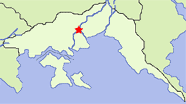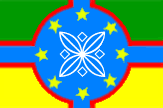L'Unité
| ||||
| Incorporation | 1845 | |||
| Province | N/A (Autonomous) | |||
| Population March 2006 est. |
545 000 | |||
| Primary Functions | Seat of Government | |||
| Mayor | Yves Hébron | |||
 L'Unité in Jonquiere-Tadoussac | ||||
A small city in central Jonquiere-Tadoussac, L'Unité acts as the federal capital and seat of the Consular Council.
History
L'Unité was founded in 1845 by a combination of two nearby villages, Maradonville and Récallet. The former was in the province of Tadoussac, while the latter was at the southern end of Jonquière. The residents of the two villages decided to amalgamate for two reasons. Practically, the villages had nearly grown together anyway, while symbolically, it would represent a fusion between the two peoples that had founded their country. It was for this latter reason they decided to call their new town "L'Unité" (English: Unity).
The new village grew slowly, but was not regarded as particularly important, except to be held up as an example of cooperation from time to time. Indeed, although it grew to be a city of 100 000, it was virtually ignored for 160 years. This changed in 2005 with the outbreak of the Jontadain Civil War. As all cities at the time, L'Unité had its local controlling faction, L'Unitéens. This group would go on to join several other local, like minded groups to form the Démocratiques, one of the four primary factions contesting the war. In addition, the newly formed Démocratiques selected L'Unité to be their headquarters, even after their victory in the battle of Jonquière.
Once the Civil War was concluding, the provisional government had decided to move the capital away from the city of Jonquière. They were already planning on moving away from the monarchy, and it was felt that selecting a new capital would be a good part of this. It was decided the capital would be moved to L'Unité; along with its symbolic nature and name, the city already had some trappings of government, having been the Démocratiques headquarters during the war. The decision was officially made in late January 2006, and when the new session of the Jontadain government opened on February 10, 2006, it did so in the city council chambers of L'Unité.
Major Industries
Two industries dominate in L'Unité: government and construction. Being the seat of the Jontadain federal government, L'Unité caters to representatives from most government departments and provinces, as well as foreign envoys. With this influx of people, the construction industry is undergoing a major boom. The population has swelled by more than three times that of five years ago. Buildings are going up all over the city for everything from government offices to embassies to apartment complexes. Largest of these projects is the Consular Building, which is slated for completion in late April 2007.
Symbols
The symbol of L'Unité is the flower of peace, which formed the centrepoint of the old L'Unitéen flag on a field of yellow and green horizontal stripes. The current flag features the flower in the centre of a modified Jontadain flag, with eight points and eight stars to represent each of the provinces.

